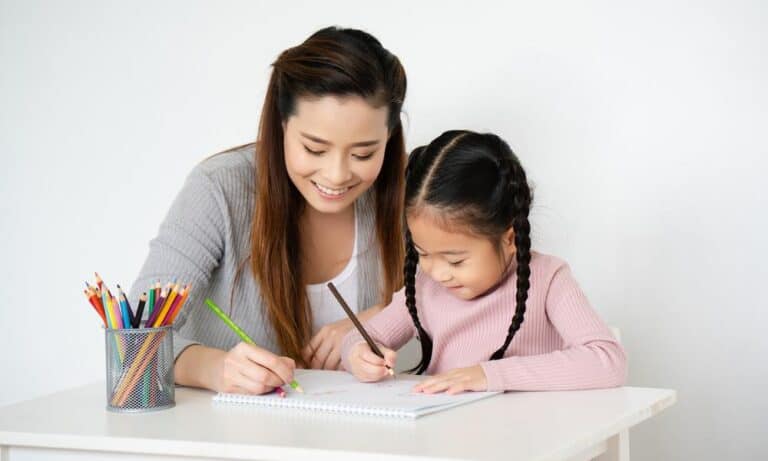As if the daily rigors of parenting children with ADHD and learning differences weren’t enough, we now face additional challenges with the onset of sheltering-in-place due to COVID-19. Now, dear parent, here are some struggles you may encounter:
- You have to coexist with your spouse or partner, if you have one, without many of your normal outlets. Did we mention that you now spend 100% of your time with that person?
- You are now your child’s teacher, and you’re not sure how to teach 2nd grade math, let alone how to teach your child with dyslexia how to read. Remember that time Karen told you she was going to homeschool her kids and you thought silently to yourself, “good luck, Karen…may the odds be ever in your favor.”? Well, now you’re Karen. We are all Karen.
- You are working from home via video conference while also trying to appear professional. This involves somehow keeping your kids from popping up in the video frame/belting out “Baby Shark” at the top of their lungs/burning the house down. Karen, how on earth did you do this without a full-time live-in staff??
Fear not. Our expert parent coaches are here to help. We can’t promise you’ll be like Karen overnight, but we can help you reduce mayhem and increase harmony in your home with some of the tips below.
What is a parent coach?
Parent coaches are clinically-trained professionals who work with parents, not children. After all, you are now spending 24 hours a day with your kids, and so you are in a much better position to be able to shape their behavior than we are. We also act as a sounding board for you and are here to provide reassurance and support, because heck, this stuff is hard on a good day. Having children who have ADHD, learning disabilities, or anxiety produce additional challenges. Here are some of the skills our pros have been using to help families during COVID-19:
- Letting go. I know, this seems counterproductive. But, as many of you already know, the more you want your kids to do something, the less likely they are to do it. Start by creating small goals for each day that have a high probability of success. What we know from the research on habit formation is that a feeling of success helps new behaviors gain momentum. So, instead of asking your kid to clean their entire room and then losing it when you come back three hours later to find that it still resembles the aftermath of a tornado, create a smaller daily goal (put away your socks today). Then, go to step #2 to increase the probability of success even more.
- Catch them doing something right. This one works well on children AND spouses/partners (trust me…I speak from experience). Kids respond well to praise. If you want to increase positive behaviors and decrease negative behaviors, catch them doing something right and praise them! For praise to be effective, it has to follow three fundamental steps, identified by Alan Kazdin, MD, founder of the Yale Parenting Center:
- Praise must be specific. “Great job putting all of your socks away when I asked you to!”
- Praise must be enthusiastic. “WOW!! GREAT JOB PUTTING AWAY ALL OF YOUR SOCKS WHEN I ASKED YOU TO!
- Praise has to include some form of touch. Depending on the age of your child, this may be a hug, a high-five, or a pat on the head.
- Structure school as closely as you can to the real-deal. Dedicate a specific room or area of your home to be the “school” area, and keep a regular schedule when it comes to school, complete with “recess” breaks and everything. Children and adults alike respond well to consistent boundaries and structure, and this also helps reduce uncertainty and anxiety for them, which will lead to improved behavior.
And lastly…
- Treat yourself with kindness and compassion. Listen, if you never got out of your pajamas today and have cheeto crumbs down your shirt and your children spent a total of 15.7 hours on the ipad….I’m here to tell you it’s ok. Tomorrow is a new day. Just like Bill Murray in Groundhog Day, you’ll get a redo. Or two. Or a hundred. Cognitive neuroscience research tells us that we are actually more likely to succeed when we forgive ourselves than when we beat ourselves up about our failures. So dust off those crumbs, put on some clean pajamas, and try again.
If you’ve found this article useful and would like more information about parenting coaching, assessment, learning interventions for struggling students, or therapy, give us a call at 650-215-6840 or send us an email from our website. Our team is standing by to help you, no matter what your child rearing concern. Please note: During the COVID-19 crisis, we’re delivering parent coaching, and all our services, through online video conferencing.
Rachael Little., M.Sc. is a registered Associate MFT/Associate PCC at Abbey Neuropsychology Clinic. She lives with her husband in Santa Clara, CA, and when she isn’t helping parents and children, she can be found training/riding/spending time with her horses (you think a 50-lb kid is hard to manage? Try a 1200-lb flight animal!). She also helps individual adolescents and adults reach their goals in psychotherapy. To schedule an appointment with Rachael or one of our other talented clinicians, call 650-215-6840.






